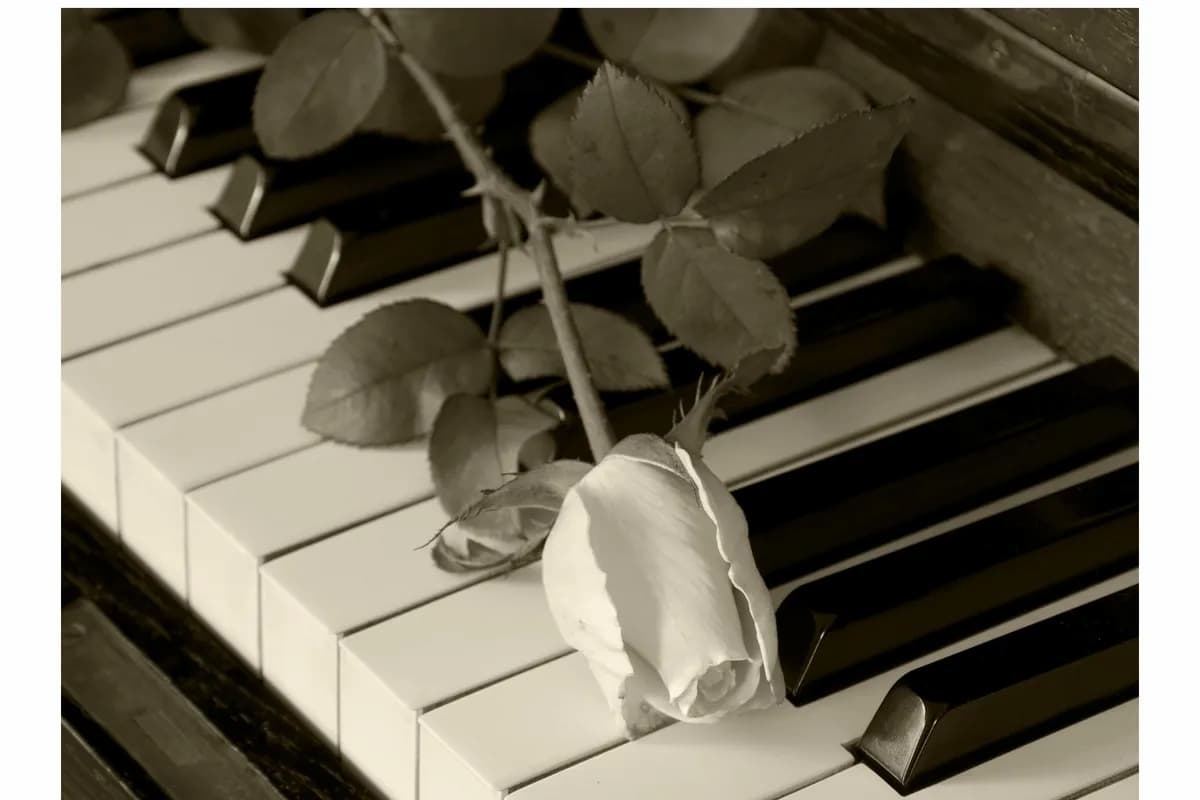Classical music can be the perfect choice of genre for funeral music. Its association with beauty, dignity, and tradition – along with its ability to comfort or evoke feelings of nostalgia – makes it appealing to many.

© classical-music.com
But there’s so much classical music out there, it can be difficult to decide what specific piece would fit a particular ceremony’s mood.
We’re here to help. Here are thirty of our suggestions of classical music for funerals, arranged by instrumentation.
Classical Piano Music for Funerals
Chopin: Piano Sonata No. 2, Movement 3
The opening to this funeral march for solo piano has become the universal musical shorthand for death.
But there is so much more to this piece than just that opening. Over the course of several minutes, Chopin transforms it into a profound and probing expression of deep grief.
Rachmaninoff: Prelude in C-sharp Minor
This dark, intense solo piano prelude haunted Rachmaninoff for his entire career because its portrait of despair resonated so strongly with audiences.
Satie: Gymnopédie No. 1
If you’re looking for a calm and thoughtful piece that creates a sensation of floating, this solo piano piece by Erik Satie is a perfect choice.
The sheet music is marked “slowly with pain” or, in an alternate translation, “slowly with grief.”
Bach: Goldberg Variations Aria
Legend has it that Bach wrote his Goldberg Variations for a count who suffered from insomnia. Historians doubt the story today. But listening to the elegant, comforting opening aria, it’s easy to see.how such a legend could have started.
Chopin: Prelude in D-flat major, Op. 28, No. 15: “Raindrop”
Chopin’s lover, authoress George Sand, once returned home on a rainy evening, only to find the composer in a trance-like state playing the piano.
He claimed he was dreaming of being drowned in a lake, with raindrops falling upon his chest.
It is said that the rain and that dream provided the inspiration for the repeated notes in this piece.
Brahms: Intermezzo in A major, Op. 118, No. 2
This bittersweet, almost unbearably intimate piano piece was written late in Brahms’s life for his dear friend and musical soulmate, Clara Schumann.
It is deeply loving and nostalgic, and beautifully captures the complicated emotions of loss and passing time.
Debussy: Clair de lune
Clair de lune (or “Moonlight”) is part of a four-movement set of piano pieces inspired by poetry by Paul Verlaine.
The first stanza reads, “Your soul is a chosen landscape / On which masks and Bergamasques cast enchantment as they go, / Playing the lute, and dancing, and all but / Sad beneath their fantasy-disguises.”
Beethoven: Moonlight Sonata, Movement 1
The dramatic, mysterious first movement of Beethoven’s Moonlight Sonata has the character of a funeral march.
Bach: Jesu, Joy of Man’s Desiring
This work is an arrangement of a portion of Bach’s 1723 cantata “Herz und Mund und Tat und Leben.”
It is gracious and elegant, and it’s often played at weddings, memorial services, and during other holidays.
Classical Violin Music for Funerals
Bach: Suite No. 2 in A-minor for Solo Violin, Mov. 3
This piece for solo violin requires the performer to play both the melody and the pulsing accompaniment simultaneously on different strings. It is gentle, sweet, and heartfelt.
Bach: Chaconne in D-minor for Solo Violin
This fifteen-minute piece of music is one of the most famous portraits of grief in classical music history.
Legend has it that Bach wrote this music after his first wife died suddenly while he was traveling.
Mozart: Adagio in E major for Violin and Orchestra
This classical era adagio for violin is wistful, melancholy elegance personified.
Bach: Largo from the Concerto for Two Violins in D-minor
This masterpiece features two violins in exquisite, deeply moving dialogue with one another.
Massenet: Meditation from Thaïs
This work was originally written to be an instrumental break between scenes of the opera Thaïs.
In the opera, the courtesan Thaïs is contemplating leaving her hedonistic life to devote herself to religion and spirituality. However, by the end of this interlude, she has chosen to follow a path that she hopes will lead her to heaven.
Vivaldi: Summer from the Four Seasons, Movement 2
The Four Seasons is a set of four concertos for violin and orchestra, with each one portraying a different season.
Vivaldi wrote poetry in the score, providing visuals to imagine while listening.
In the slow movement of Summer, a shepherd rests and awaits a coming rainstorm.
Classical Orchestral Music for Funerals
Barber: Adagio for Strings
Samuel Barber’s tragic “Adagio for Strings” has a deep association with funerals, especially in the United States.
It was played at funerals of Albert Einstein and Franklin Delano Roosevelt and programmed by conductor Leonard Bernstein after the Kennedy assassination.
Elgar: Nimrod from the Enigma Variations
The Enigma Variations is a multi-movement piece of instrumental music written by English composer Edward Elgar.
The “Nimrod” variation is a portrait of a friend who encouraged Elgar to keep composing even when he was deeply depressed and considering giving up on music.
Much like the Barber Adagio that has gained popularity in America, this piece is often used at funerals in Britain.
Albinoni: Adagio in G-minor
This is a quiet, reserved, mesmerizing adagio from the Baroque era.
Brahms: Symphony No. 3, Movement 3
This movement is a wistful piece for orchestra – a perfect choice if you want to hear something emotional, but also restrained and introspective.
Ravel: Pavane pour une infante défunte
Translated, the title of this piece means “Pavane for a Dead Princess.”
It isn’t a tribute to a specific dead woman (indeed, Ravel claimed he only named it that because he liked the sound of the words together), but rather a tribute to the atmosphere of Spain. Nevertheless, it would be beautiful to play at a funeral.
Beethoven: Symphony No. 7, Movement 2
This is a stately and unforgettable piece of symphonic music, and “a funeral march in all but name,” according to the Encyclopedia Britannica.
Bach: Air on the G-string
This piece comes from the second movement of Bach’s third orchestral suite. It is a pensive slow dance, heart wrenching but also somehow peaceful.
Mascagni: Intermezzo from Cavalleria Rusticana
This piece for orchestra may be melancholy, but it’s also dreamy and full of yearning, too. The organ part gives it a religious feeling.
Classical Vocal or Choral Works for Funerals
Mozart: Lacrymosa from the Requiem
Mozart died before he could finish his Requiem. Upon his death, he was writing this dramatic movement.
Schubert: Ave Maria
In this song, Schubert set a poem from Walter Scott’s The Lady of the Lake to music. The poem was a prayer of a character named Ellen, who calls upon the Virgin Mary for assistance.
(If you’re interested, there are many adaptations of this one for various instruments. A cello and piano arrangement would be especially mournful.)
Fauré: Pie Jesu from the Requiem
Faure’s Requiem is widely considered to be the most peaceful and lyrical requiem ever written.
Unlike other composers’ Requiems, there is very little in the music about God’s wrath or judgment here. Rather, it is primarily a celebration of the peace of death and eternal rest.
Handel: Largo from Xerxes
This aria is from Xerxes, a failed opera that only lasted for five performances before being shut down. However, during the Victorian Era, this aria took on a life of its own.
Its lyrics include “May thunder, lightning, and storms / never disturb your dear peace, / nor may you by blowing winds be profaned,” making it a moving choice to use at a funeral.
Bach: Agnus Dei from Mass in B-minor
This is a haunting, arresting example of Baroque choral music.
Allegri: Miserere mei, Deus
This piece dates from the seventeenth century and is a setting of Psalm 51, which begins with the Latin words for “Have mercy on me, O God.”
It is otherworldly and is famous for its soaring soprano lines.
Duruflé: Agnus Dei from Requiem
This emotional 1947 requiem was written in memory of the composer’s father and would be an especially moving tribute for a parent.
Dealing with the death of a loved one, along with planning a funeral, is one of the hardest things we can do as human beings.
Luckily, during these tough times, we can take comfort in the beauty and timelessness of classical music.
Our hope is that one or more of the suggestions on this list might help to create a meaningful moment that will be comforting to you, and also honor the loved one you’re laying to rest. Wishing you and your loved ones peace.
For more of the best in classical music, sign up for our E-Newsletter

